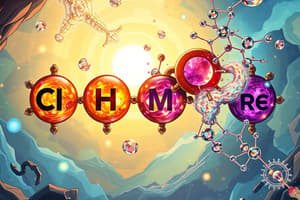Podcast
Questions and Answers
What is the main focus of inorganic chemistry?
What is the main focus of inorganic chemistry?
The study of inorganic compounds and their properties
What are some practical technologies that inorganic chemistry is essential for understanding?
What are some practical technologies that inorganic chemistry is essential for understanding?
Catalysis, materials, energy conversion and storage, and electronics
How is inorganic chemistry integrated with other branches of chemistry?
How is inorganic chemistry integrated with other branches of chemistry?
Fully integrated with organic, analytical, biochemistry, and physical chemistry
What are some important subtopics in inorganic chemistry?
What are some important subtopics in inorganic chemistry?
What are covalent organic frameworks (COFs) known for?
What are covalent organic frameworks (COFs) known for?
What are some examples of sustainable chemistry developments in inorganic chemistry?
What are some examples of sustainable chemistry developments in inorganic chemistry?
What is the potential application of the novel molecule 'BNBN anthracene'?
What is the potential application of the novel molecule 'BNBN anthracene'?
What are researchers working on in the development of covalent organic frameworks (COFs)?
What are researchers working on in the development of covalent organic frameworks (COFs)?
What is the focus of inorganic chemistry in terms of molecular interactions?
What is the focus of inorganic chemistry in terms of molecular interactions?
What is the nature of inorganic chemistry as described in the text?
What is the nature of inorganic chemistry as described in the text?
Flashcards are hidden until you start studying
Study Notes
Introduction to Inorganic Chemistry
Inorganic chemistry is a fundamental branch of the chemical sciences that deals with the study of inorganic compounds and their properties. It is essential for understanding various practical technologies, including catalysis, materials, energy conversion and storage, and electronics. Inorganic chemistry is a consolidated field, fully integrated with other branches such as organic, analytical, biochemistry, and physical chemistry.
Key Subtopics in Inorganic Chemistry
Some important subtopics in inorganic chemistry include:
-
Catalysis and Materials: Inorganic chemistry plays a crucial role in the development of catalysts and materials with various applications, such as energy conversion and storage, and electronics.
-
Emerging Class of Materials: Researchers have been developing new materials, such as covalent organic frameworks (COFs), which have tunable molecular structures, large surface areas, and potential applications in various fields.
-
Computational Modeling: Inorganic chemistry has seen the development of computational models that can capture the elusive transition states of chemical reactions, helping to understand the underlying mechanisms and design new materials.
-
Molecular Interactions: Researchers have discovered that molecules can exhibit non-reciprocal interactions without external forces, shedding light on the behavior of molecules in various environments.
-
Sustainable Chemistry: Inorganic chemistry is also focused on developing efficient, environmentally friendly processes and materials, such as recyclable batteries and fire-inhibiting nonflammable gel polymer electrolytes for lithium-ion batteries.
Latest Research and Discoveries
Several recent breakthroughs in inorganic chemistry have highlighted the field's potential for innovation and the development of new materials and processes. For example, a research team successfully synthesized and characterized a novel molecule called 'BNBN anthracene', which could have potential applications in organic semiconductors. Additionally, researchers have been working on the development of fast, low-cost, scalable methods for the production of covalent organic frameworks (COFs).
Inorganic chemistry is a vibrant and dynamic field, with new discoveries and advancements constantly emerging. From the development of new materials to the understanding of molecular interactions, inorganic chemistry continues to play a crucial role in the advancement of human knowledge and the improvement of our lives. As research continues, the potential for new breakthroughs and applications in inorganic chemistry is endless.
Studying That Suits You
Use AI to generate personalized quizzes and flashcards to suit your learning preferences.




